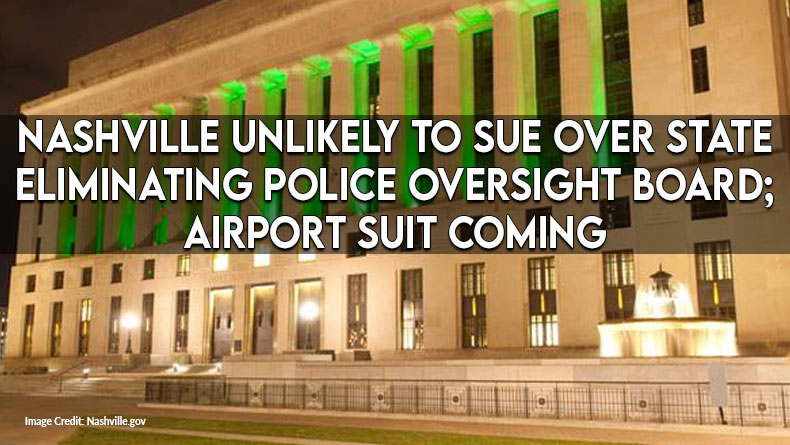Photo: Historic Metro Nashville Courthouse Photo Credit: Nashville.gov
By Adam Friedman [Tennessee Lookout -CC BY-NC-ND 4.0] –
Metro Nashville is unlikely to file a lawsuit over state legislation eliminating its civilian police oversight board, leaving a community lawsuit as potentially the only option.
Jill Fitcheard, the executive director of Metro Nashville Community Oversight Department, told the Lookout that latest discussions with Metro’s legal department indicate the city won’t file a lawsuit challenging the new state law, which was signed by Gov. Bill Lee Wednesday and set to go into effect later this year.
“I think we should challenge this because otherwise, we’re letting the state overturn the will of the voters who created the oversight board in the first place,” Fitcheard said. “More than 134,000 people voted for it.”

During this year’s legislative session, state lawmakers passed six bills targeting the operations of Nashville. So far, Metro Nashville has only challenged legislation that cut the Metro Council from 40 to 20 members, which a three-judge panel temporarily stopped from going into effect.
The police oversight bill eliminates these boards — which typically consist of city appointees given authority to investigate police misconduct against civilians — across the state, explicitly targeting Nashville and Memphis, whose boards are the only ones not in compliance with current law. Knoxville and Chattanooga have oversight panels that can likely stay in place.
A city referendum passed overwhelmingly in 2018 created the current Nashville police oversight board.
The Interdenominational Ministers Fellowship are discussing how they can file a suit without Nashville signing on, said Davie Tucker, the group’s leader.
These discussions come as a group of community members held a news conference a city hall earlier this week demanding Nashville take action to try and save the oversight board.
“It’s disappointing that as Metro tries to prioritize what state laws to fight, policing is at the bottom of the list,” Tucker said.
Metro Nashville Legal Department Director Wally Dietz said his department was taking any law that “specifically targets Nashville’s governing authority very seriously.”
But, the police oversight elimination law targets multiple cities, making it tougher to challenge based on home rule, which prevents lawmakers from passing legislation targeting individual cities without their consent.
Nashville has successfully challenged state laws in the past over violations of home rule. But after losing a lawsuit over school vouchers — which targeted Nashville and Memphis — Dietz said it’s harder to know how the court would rule.
Nashville focusing on home rule challenges: airport and speedway bills most likely to be challenged
It’s widely expected that the next suit Nashville files will challenge the state’s takeover of the Nashville Airport Authority. The legislation allows the governor, lieutenant governor and House Speaker to appoint six of the eight seats on the airport authority board. Currently, Nashville’s mayor has authority to appoint all board members.
Lee has until Saturday to sign this legislation, let it become law or veto it — Lee has never vetoed a bill — after which Metro can file a lawsuit.
Legislation lowering the voting threshold for renovations at the Nashville Speedways Fairgrounds is another bill likely to run afoul of the home rule because it specifically targets the Metro Nashville Council.
The fairground law would allow Bristol Motor Speedway’s proposed remodel of the speedway to pass the Metro Council with 21 votes instead of 27.
“Metro should push back against all of the state overreach legislation, including filing lawsuits if necessary,” said Metro Councilmember Bob Mendes. “Even if the mayor or some council members like some of the legislation, the city has to fight back or we risk setting a precedent that state overreach is okay.”
Laws targeting the Metro Nashville Sports Authority board and Music City Convention Center funding could be hardest to challenge in court.

Lawmakers didn’t take majority control of the sports authority, which oversees all public sports stadiums in Nashville. Instead, the governor and legislative leaders will appoint six of the 13 seats.
The Music City Convention Center legislation restricts the board from spending excess revenue on certain projects. Previously, extra money has been used to add restrooms on Lower Broadway and help with the cleanup after the Second Avenue bombing. But, those projects could still be allowed under the new law.
The convention center legislation also allowed Gov. Lee to appoint Tennessee Comptroller Jason Mumpower, Tennessee Treasurer David Lillard and Tennessee Secretary of State Tre Hargett to its board as non-voting members earlier this week.




